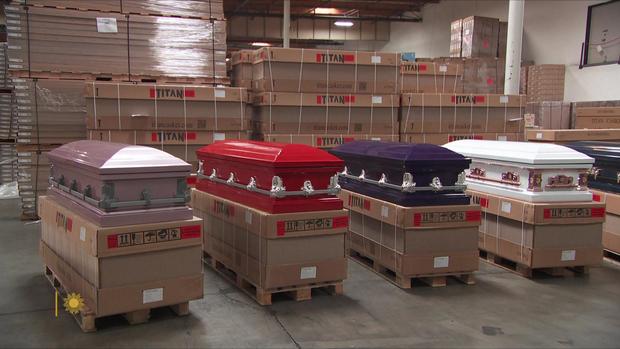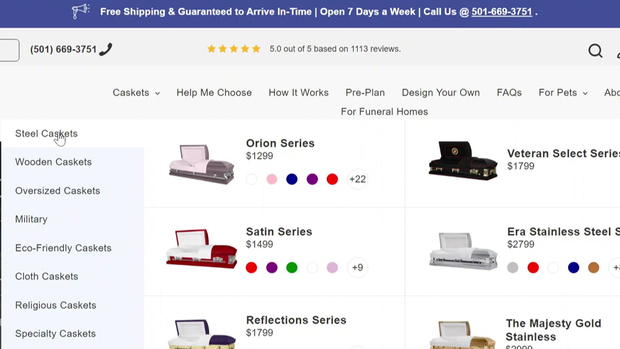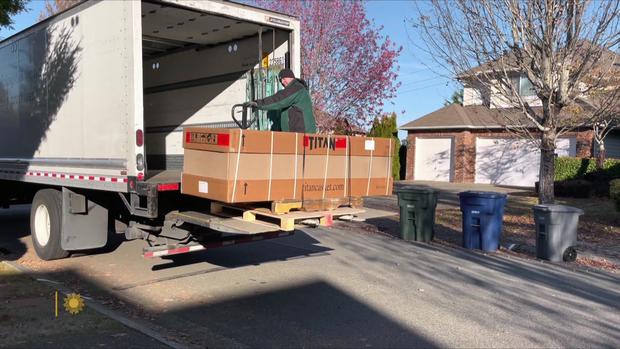Laying to rest consumers’ concerns over the price of caskets
Christo Ayoub was the kind of person who believed his treasures were stored in Heaven. “His main concern was to just bring light to people that were not aware of God,” said his daughter, Carol Sfeir.
But that also meant, according to Sfeir, that here on Earth, in Orange, California, finances were tight when it came time for Christo’s funeral. So, she turned to the place so many of us do to try to find a deal.
Burbank asked, “Did anybody in your family initially think that you had lost your mind when you said I found a casket on the Internet, and it’s more affordable? Did they think, ‘Oh wait, Carol’s losing it?'”
“Yeah, a little bit!”
Facing mounting costs, Sfeir learned that she didn’t have to buy the casket from the funeral home: “I asked, because the price was so, you know, outrageous. You can only save in so many areas, so you just have to cut corners where you can.”
And her search for savings led her to Josh and Liz Siegel’s company, Titan Casket. The Siegels are looking to, as they say, “disrupt” the casket industry by changing how people buy them, and what they pay.
CBS News
“There are two large casket manufacturers that control 85% of production, and they only sell to funeral homes,” said Josh. “And when a family walks into a funeral home, they’re often not shopping around. They don’t know what things should cost. Those dynamics over time have meant that there’s massive markups on caskets.”
The average American funeral costs about $10,000; the average casket more than $2,000.
Titan’s caskets average around $1,000. “We see ourselves more as providing a service and an education for people who contact us,” said Liz. “We want everybody ultimately to feel like they have had a choice.”
Titan Casket
And that choice is due to an obscure Federal Trade Commission ruling from 1984, called the “Funeral Rule,” which says, basically, that funeral homes must provide customers with a list of prices for their services, and allow them to buy a casket from wherever they choose – including, these days, from Amazon, where Titan co-founder Scott Ginsberg got his start.
He said, “As technology has changed, this industry hasn’t changed in over a hundred years. Why not?”
“Is the real difference, you’re just not marking these up as much?” asked Burbank.
“That’s correct. We’re not marking them up, and we still have a great company, and we’re not, you know, taking advantage of the consumer.”
CBS News
Titan says they now sell thousands of caskets a year direct to consumers. But even with that success, they may be trying to grow in an industry that is, pardon the pun, dying.
Caitlin Doughty is a mortician and writer who says Americans should really reconsider the funeral. “Cremation right now is the dominant method of disposing of a dead human body in the United States; almost 60 percent of people are cremated, and not all those people need a casket,” she said. “And so, when you take away the embalming and you take away the casket, it’s kind of like, what is the role of the funeral director?”
Doughty said the sooner we get comfortable talking about death and dying, the better decisions we’ll be able to make. “I absolutely think what Titan is doing to offer lower prices is important, because everybody should be able to make really informed choices,” she said.
And Carol Sfeir would agree. She said an informed choice (and a little internet clicking) helped her honor her beloved dad. “It was really the only casket that suited him,” she said. “So, I believe he would be happy with that.”
For more info:
Story produced by Amol Mhatre. Editor: Remington Korper.
For all the latest Automobiles News Click Here
For the latest news and updates, follow us on Google News.




